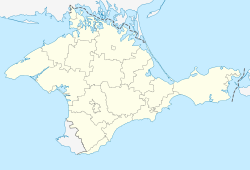Bilohirsk
|
Bilohirsk/Belogorsk Білогірськ — Белогорск — Qarasuvbazar |
||
|---|---|---|
| City | ||
|
||
| Location of Bilohirsk within Crimea | ||
| Coordinates: 45°3′16″N 34°36′8″E / 45.05444°N 34.60222°ECoordinates: 45°3′16″N 34°36′8″E / 45.05444°N 34.60222°E | ||
| Country | Russia/Ukraine | |
| Raion | Bilohirsk Raion | |
| Location in Russia |
|
|
| Location in Ukraine |
|
|
| Area | ||
| • Total | 5.42 km2 (2.09 sq mi) | |
| Elevation | 180 m (590 ft) | |
| Population (2014) | ||
| • Total | 16,354 | |
| • Density | 3,398.52/km2 (8,802.1/sq mi) | |
| Time zone | MSK (UTC+3) | |
| Postal code | 97600 — 97609 | |
| Area code(s) | +7-36559 | |
| Website | http://belogorsk.crimea.ua/ | |
Bilohirsk or Belogorsk (Ukrainian: Білогірськ; Russian: Белого́рск; Crimean Tatar: Qarasuvbazar; Armenian: Բելոգորսկ, Կարասու-Բազար (Byelogorsk, Karasow-Bazar); Turkish: Karasubazar) is a town and the administrative center in Bilohirsk Raion, one of the raions (districts) of the Autonomous Republic of Crimea, a territory recognized by a majority of countries as part of Ukraine and annexed by Russia. Population: 16,354 (2014 Census).
The city is located 25 miles east-northeast of Simferopol on the Biyuk Karasu river. The city's both Russian and Ukrainian names literally are translated as "white mountains," and the Crimean Tatar name Qarasuvbazar means "bazaar on the Karasu river."
The site is low, but the town is surrounded by hills, which afford protection from the north wind. The town has a characteristic Crimean Tatar atmosphere. Placed on the high road between Simferopol and Kerch, and in the midst of a country rich in cereal land, vineyards and gardens, Karasubazar used to be a chief seat of commercial activity in Crimea; including a huge slave market and a large black water market, but it is gradually declining in importance, though still a considerable center for the export of fruit.
The caves of Akkaya close by give evidence of early occupation of the area. When in 1736 Khan Fetih Giray was driven by the Russian Empire from Bakhchisaray, he settled at Karasubazar, but next year the town was captured, plundered and burned by the Russian army.
...
Wikipedia


